| Music | The Netherlands | ||||||||||||||||||||||||||||||||||||||||||||||
BAFA © 2010. All material here is copyrighted. See conditions above. |
Hugo van Bolhuis
musician, The Netherlands
|
 Hugo Bolhuis at the Leiderdorp monthly Bahá´í children's classes.. |
Why this interview? Because I'm an artist and my musical life story is of any importance? Well, I certainly feel like an artist: I have a all the neurotic |
characteristics some people associate with artistic personalities. And I simply love music, especially the music that offers consolation and moves people. In music I find signs of God's mercy and compassion. And I especially enjoy community singing because it can make people feel united, loving and happy. And yes, with the 5½ guitarchords I have mastered, I did get the opportunity to contribute musically to the Bahá'í community in a small way. But there are no serious artistic accomplishments. No, through music I was part of some very exciting developments in the recent past of the Bahá'í community of the Netherlands (and Europe). And I love to talk about those.
|
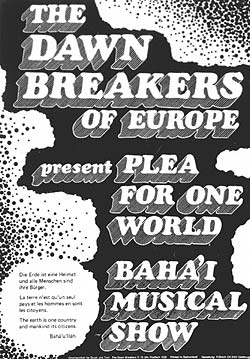 Poster used to the 1970 summer tour.. |
 DB 70 (The 1970 European Dawnbreakers Group) Left to Right: Claude Herzog (France), Hugo van Bolhuis (The Netherlands), Dick (David) Riem (NL), Ginger Rogers (Spain), Shahram Payam (Denmark), Gambiz Poostchi (Austria), Charles Hamburger (NL). Front: Kambiz Poostchi, Vida Taherzadeh (Ireland), Bruce Butler (U.S.A.). |
Ok, I was brought up with live music. There was always music in the home as often professional musicians came to our house where my father would accompany them on the grand piano. I had piano lessons as a child and for one very short moment in time I could even make my parents believe their son to be a prodigy. When I was 11, I won a competition in composition. Like most classmates I had written a small piece of music for piano. But then someone gave me a tip to write the scores for the string ensemble that was performing at our school. That did the trick. I was amazed how well it sounded. I won first price. |
But my parent's dream was soon to be shattered. When I was twelve I quit piano-playing. My brother's guitar became more interesting. After some years I began taking lessons and my parents gave me my first, beautiful, classical guitar. At age 18 I was most fortunate to meet Julian B. Coco, in those days a well-known West Indian classical guitarist. He agreed to teach me for a while. Those were days of working on my guitar six hours a day till there were no fingers left. He coached me when I applied for music school. But when I had to play for the entrance examination, I was so nervous and my hands shook so much that I completely ruined the delicate harmonic notes that I had rehearsed so ambitiously. Even now more than 30 years later, my face still burns red in embarrassment. I decided then and there: No professional career in music for me!
|
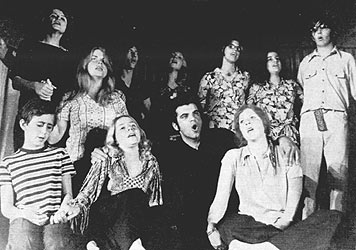 DB 70 (The 1970 European Dawnbreakers Group) Front, Left to Right: Bijan Sobhani (Germany), Wendy (Momen) Worth (U.K.), Fari Khabirpoor (Luxemburg), Ginger Rogers (Spain), Back Row: Ann Rowan (fore), Mehrdad Poostchi, (U.S.A.), Mehrdad Poostchi (Austria), Patricia van Lith (NL), Candy McCurdy (Luxemburg), Vida Taherzadeh (Ireland), Bruce Butler (U.S.A.) |
I was surrounded by lots of warm loving young people, who encouraged me to sing and play. They praised me straight into the Faith. I have such warm memories of singing for and with these wonderful people.
|
All the Bahá'í youth were invited to Rotterdam in the Charles Hamburger home to work with a hired professional to learn and perform the songs. About 25 of us performed about once every two months in theatres and we were fairly popular, at times completely filling the theatres.
|
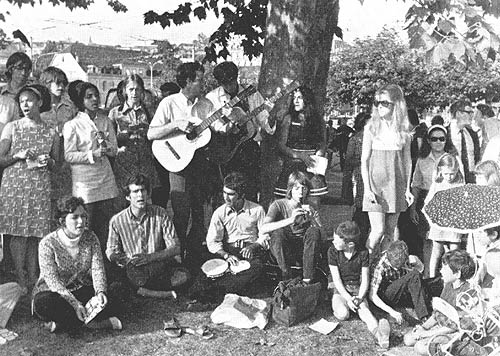 DB 70 (The 1970 European Dawnbreakers Group) -more or less the whole group. Left to Right: (on the ground): Roya Khamsi (Switzerland), Dick (David) Riem, (NL), Naysan Faizi (U.K.), Robin Niehy Reynard (Denmark), Left to Right: Bruce Butler (U.S.A.), Cecilia Pharr (Denmark), Candy McCurdy (Luxemburg), Azar Chayani, Rosemary Magill (Ireland), Hugo van Bolhuis (with guitar), Jeff Ault (U.K.), Vida Taherzadeh (Ireland), Linda Marshall (U.S.A.) | Because of the diversity of our group and a lot of talent we could incorporate lovely touches such as live Persian dance (thank you Asar), American Gospel (thank you Cecilia), an Elvis Presley hit (thank you Ginger) and a part of Tchaikovsky's violin concerto (thank you: Bijan).
|
Belgium, France, Switzerland, Lichtenstein, Austria, Germany, Denmark, and The Netherlands. Our show improved as we traveled and at times the audience was wildly enthusiastic or deeply moved. The whole tour was broadly covered by the media (newspaper, radio and television). Of course we had a secret weapon in our PR group, a real American movie-star: Linda Marshall.
|
 Relipop a quartet, where one showed the slides and three performed music. Summer 1971. Left to Right: B. van Bolhuis, Ursula Namdar (Zurich), Dick (David) Riem, Hugo van Bolhuis. front: Eddie Kollaart and Faizollah Namdar (Zurich). | In the summer of 1971, I was part of a small group with Eddie Kollaart, Reza Reyhani, and Dirk (David) Riem. We toured in Reza's red Volvo with a musical-slide presentation called "Relipop" throughout four West European countries. It was a simple formula, but it worked very well.
|
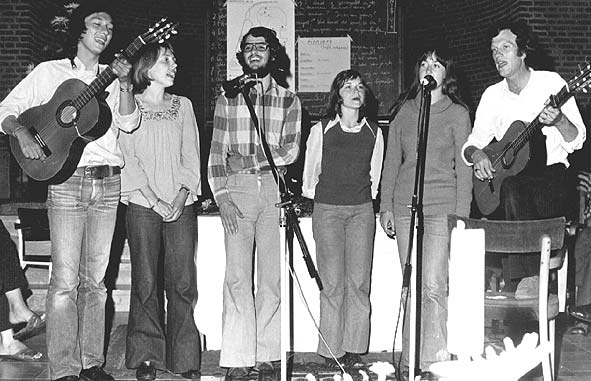 Great Day, a Dutch music group of the early 70's. Hugo van Bolhuis is on the far right with guitar. |
Music was such an important part of our community in the '70s that there even was a real national committee for music, and being part of this committee is one of the high points of my life. We were all "artistic" and slightly chaotic youth so you can imagine we had a great time. And we even managed to publish the first Dutch children's songbook, "Weet je waarvan ik nu zing" (Do you know what I'm singing about).
|
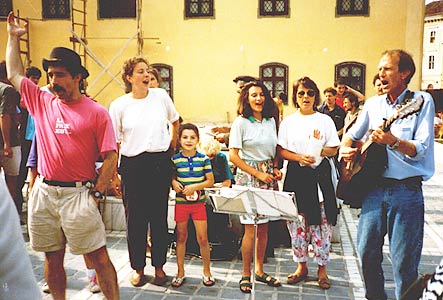 1991 in Romania Left to Right: ?? (French-Canadian), Esther, ??,??, Hugo van Bolhuis with guitar. | In 1991 I relived some of the atmosphere of Dawnbreakers and Great Day while in Romania during the summer with my son. We went to what came to be known as the first international youth conference in Eastern Europe. I took my guitar and music, just incase. I even had written a small, funny song in Romanian. Before I knew it, I was playing on the street, on the beach, everywhere, and people crowded around the Bahá'í stands. So I ended up travel teaching with my guitar for another week in Brasov. |
 Hugo van Bolhuis on left, at a Dutch Bahá´í summer school in 1986. Looking back, I know I am not a great talent as a musician but with my guitar I was given a place in the Dutch Bahá'í community, where I could feel useful. My fondest memories are community singing especially with the children. In the past I did this regularly at national events such as summer- and winterschools. Currently our monthly regional Bahá'í children's school "De Schitterende Ster" (the Brilliant Star) always ends with us singing together.
|
|
Arts Dialogue, Dintel 20, NL 7333 MC, Apeldoorn, The Netherlands email: bafa@bahai-library.com |